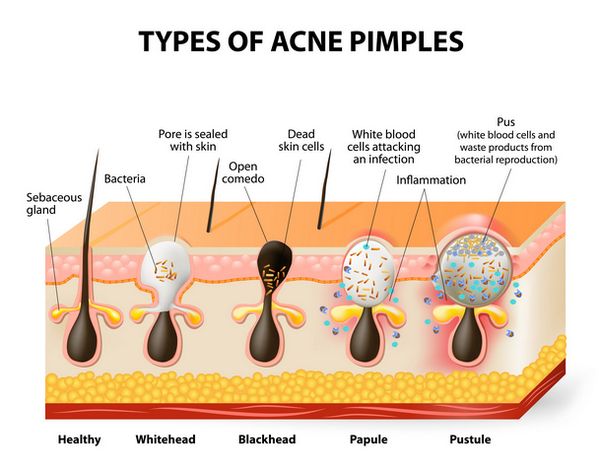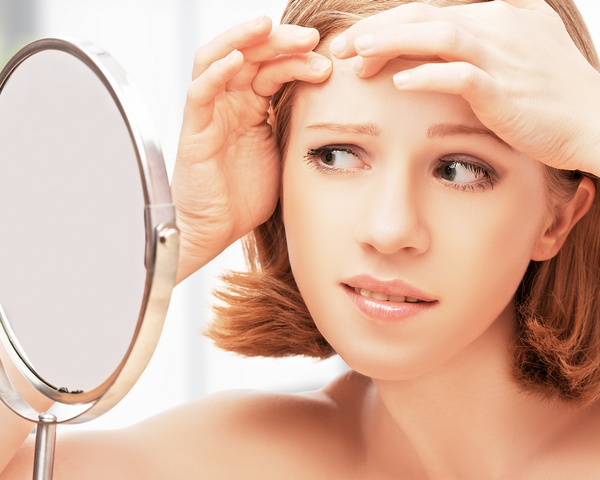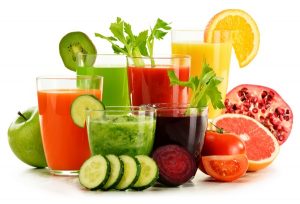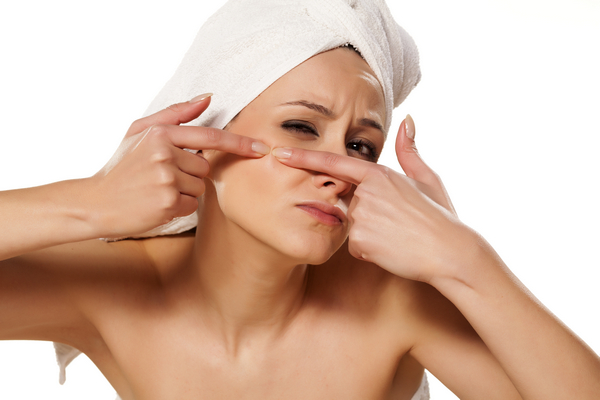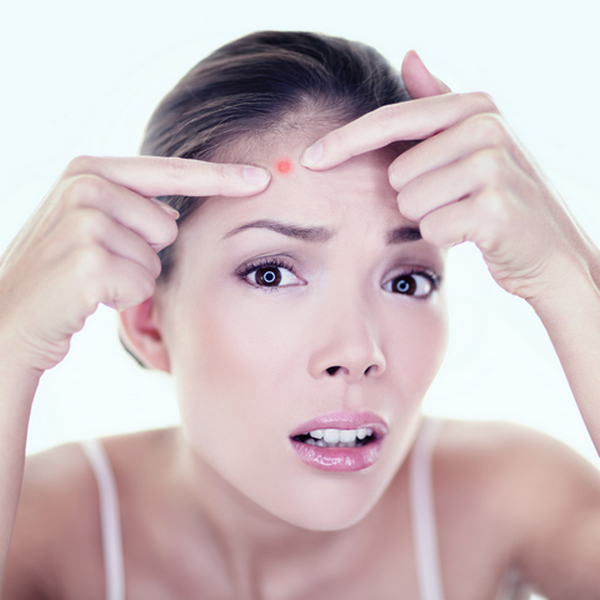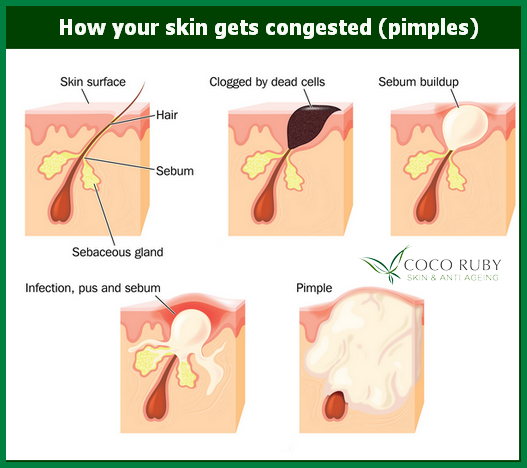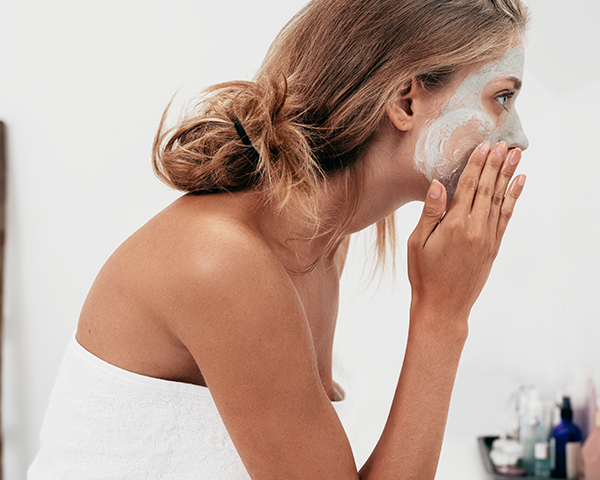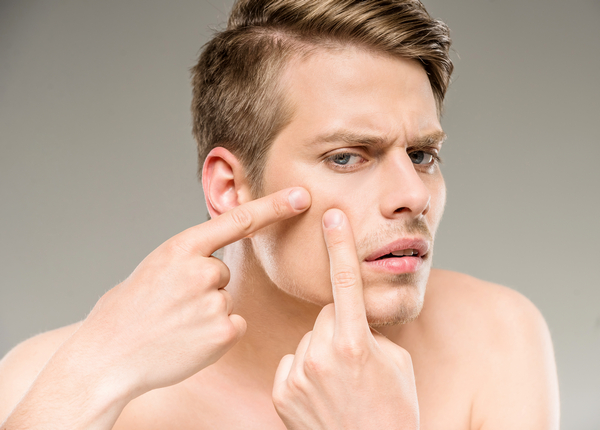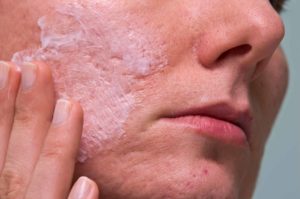What Causes Acne? – Understanding Acne and Tips for Acne Treatment
What causes acne? You’ve probably heard that chocolate, soft drinks and chips may worsen your breakouts and acne. So does what you eat actually have an impact on your acne breakouts, whiteheads and blackheads? Let’s find out if what you eat DOES impact the number of breakouts you have.
Download your Free 18 page Guide to Facial Rejuvenation treatments in Melbourne

What actually IS Acne?
Acne is one of the most common skin conditions or skin diseases. It is a condition commonly linked with hormonal changes. Hence, acne is quite common in teenagers during key stages of adolescent or early adulthood development that involves hormonal changes. However, adults can also develop acne, even later in life.
The great news about acne is that it’s not necessarily a dangerous health condition. Uncomfortable and annoying, yes, but not damaging. Unless you pick at the pimples or the acne gets infected, both of which can wreak havoc and leave scars.
The worst thing that usually happens with acne, is that you may be left with facial scarring (pitted acne scars) or acne scars on your back or chest – wherever you have, or had, extremely active acne.
How do you recognize breakouts as Acne on your body?
Acne is actually a term commonly used to describe variety of skin blemishes or ‘skin congestion.’
If you have ‘congested’ skin, then acne usually appears in the form of pimples. Most frequently, acne is seen on the face, but it can also appear on your neck, back, chest or shoulders.
Different Types of Acne
We commonly refer to it when we speak about pimples. But there are several TYPES of acne blemishes.
- Whiteheads are common: they remain under the skin’s outermost layer. If they become angry-looking and infected, or if you pick at them, they can leave pitted types of scars. (Our Dermal Clinicians can help reduce your breakouts.)
- Blackheads are also common: these appear on the surface of the outer layers of the skin; are turn black due to environmental reactions and hence, are visible – they can also leave indentation types of scars
- Papules: these appear as small, pinkish bumps on the surface of the skin
- Pustules: red ‘dots’ that are filled with pus.
- Nodules: large pimples, embedded deeply into the skin, and sometimes difficult to treat at home – see one of our Dermal Clinicians
- Cysts. They are also filled with pus and are very painful.
What makes acne worse?
With any form of acne, the KEY thing you’ll need to remind yourself to do – is NOT to make it worse.
Most people use the wrong products or wrong approach to acne care.
Sadly, the wrong products – and the wrong approaches – for treating pimples and blackheads may actually worsen the condition and lead to more flare-ups.
It’s well worth it to investigate the RIGHT products for your skin – but this should be done with a professional trained in skin care and acne treatments, not just by looking at misleading advertisements on the web or in discount chemist stores.
Store-bought products for acne are NOT the same as medical-grade cosmeceutical acne products or professional skincare treatments.
You want to be sure to use the right products (cosmeceutical or medical-grade acne treatment products) and investigate the power of light therapies, laser treatments, and skin peels.
Light therapies, skin peels and highly-active ingredients in quality skincare products can do a lot to deter your acne breakouts.
The key is finding the right treatment and the best products that can help get your skin looking great, despite having acne.
But effective acne treatment it requires educating yourself, first, by having a thorough skin assessment with a professional.
What you do at home is as important as what your clinician does for treating acne at the Skin Care Clinic. Both are crucial to keep the breakouts, the blackheads and acne pimples at bay.
Can you prevent acne from leaving a scar?
Typically, you can prevent scarring with acne. It all depends on how you work with the breakouts – do you do the right thing or do you do the wrong thing, and pick at the breakouts, use the wrong products on your skin and otherwise make your breakout even worse?
IF you are careful and IF you follow your dermatologists or dermal clinician’s instructions during a breakout, the outcome of scarring can often be readily avoided.
So What causes Acne?
Acne is commonly associated with hormones and sebum production; these change throughout your lifetime and are part of the process of growing older or becoming an adult.
SEBUM and Acne: When reaching puberty, the human body starts to release more of an oily substance called sebum. Excess sebum is often released through glands on the face, shoulders, back and chest.
This element – sebum – is oily and viscous, and hence is often responsible for blocking the small pores of your skin.
The blockage then allows bacteria to grow. This process – the blocking of the pore (gland) and the oily sebum attracting bacteria – can lead to acne inflammation and skin breakouts.
This is why acne usually happens to adolescents, even though people of all ages get acne.
As in the case of many skin reactions, even the best skincare experts don’t always know exactly how to explain acne and who gets it or why – e.g., what stimulates it for each person.
Even though this is a normal, biological process for the human body to reach adulthood, other factors that interact with one another may end up encouraging the development of acne.
Some factors associated with skin that is prone to acne breakouts or blackheads
The skin, as an organ, has multiple influences affecting how it looks and functions over time. This includes acne, oiliness or dryness, and even wrinkles.
Factors that may impact your likelihood to get acne include:
- Heredity
- Hormone changes
- Periods
- Pregnancy
- Oily cosmetic products
- Sebum production
How do you know if you have hormonal acne?
Do you know that about HALF of all women between the ages of 20 and 29 have acne? Even women in their 40s and 50s can have acne, especially during changes associated with later-life pregnancy or menopause. About 1 in 4 women between 40 and 49 have acne. If YOUR acne gets worse and you get more pimples around periods linked to fluctuations in your hormones, you may have what’s known medically as hormonal acne.
Hormonal Acne: Definition, Causes and Types of Acne Conditions
Hormonal acne is acne caused by (or becoming worse during) fluctuations in hormone levels. Although it’s often associated with hormone fluctuations that occur during puberty or early teen years, hormonal acne CAN affect adults at any age or stage of life.
About Hormonal acne:
- it is common in women and men
- is especially common in women, as they have more frequent changes in their hormone balances during menstruation and/or menopause
- it is the most common type of Acne during puberty
- can also occur during pregnancy or after delivering a baby
- tends to become less frequent for many individuals by the time they reach their 30s and 40 but can flare up again around times of menopause
Adult Acne – is it hormonal acne or just pimples?
Diagnosing Acne Causes is Difficult for Many Medical Professionals and Skin Care Experts but treatments can be effective if a holistic approach is used.
- Like many aspects of skincare, opinions between skincare experts and Dermatologists on assessing acne contributors and skincare regimes can vary widely.
- As an example, the Mayo Clinic’s medical experts believe hormones aren’t the MAJOR factor in cases of ADULT acne; but suggest underlying medical conditions may be changing hormones.
- They suggest adult hormonal acne is simply a SYMPTOM of something ELSE that occurs in the body, that leads to hormonal fluctuations that then lead to acne.
- In other cases, adults with acne may not have any “measurable” hormone issues. This can make diagnosis and treatment challenging.
What does Hormonal acne look like?
Hormonal Acne – characteristics and distribution of acne on the face
- If you have hormonal acne during puberty, acne pimples or blackheads may appear in a T-zone formation – the facial region that includes your chin, nose and forehead.
- Hormonal ADULT acne typically shows up more along the lower part of your face, primarily around your chin, jawline or lower cheeks.
- Hormonal acne can take the form of small pimples with heads, cystic acne, blackheads or whiteheads – everyone has it differently.
- Cysts are those larger acne blemishes that form deep under your skin’s surface, and they don’t often come to a head. The can be a sign of inflammation and picking at them can cause serious infections so see a professional skincare expert, Dermal Clinician or Dermatologist if you have a pimple.
- At Coco Ruby in Hawthorn/Melbourne, we have acne skincare experts who can help evaluate which products and facials are actually GOING to help REDUCE your acne breakouts versus which ones will be a waste of money. Phone (03) 8849 1400 and book in for an acne consultation.
- You can order skincare products for acne and buy online – but for acne, you are always recommended to see a Dermal Clinician or other skincare experts FIRST so you know that what you’re buying is actually going to be RIGHT for YOUR particular type of acne or pimples.
Causes: Expert opinions on causes of hormonal acne vary.
However, hormonal acne MAY be caused by influxes of hormones from:
- periods (menstruation)
- PCOS (polycystic ovarian syndrome)
- menopause (the “change of life”)
- increased androgen levels
- imbalances in testosterone hormone levels to estrogen hormone levels
What factors increase pimples and breakouts?
Acne may aggravate skin problems because it leads to:
- excess sebum production
- more natural oil production increasing your chances of having blocked/clogged pores or blocked hair follicles/cysts
- elevated levels of skin inflammation and dermal irritation
- more acne-causing bacteria Propionibacterium acnes on your skin, worsening the condition.
How you care for HORMONAL acne – how you treat this form of acne – is crucial to whether it stays the same, gets better or worse.
The first step is NOT to buy everything you see online, that claims to treat hormonal acne or unwanted breakouts.
- The first step is to meet with an acne skin care expert Dermal Clinician or a Cosmetic Physician or Dermatologist who has expertise in SKINCARE regimes that actually WORK.
- But each person is unique and it’s NOT just skincare that’s causing your acne and hormonal breakouts.
- Get a holistic opinion from our Dermal Clinician skincare experts, by requesting an assessment on (03) 8849 1400 at our lovely boutique style medical skincare clinic in Melbourne.

The impact of nutrition on Acne.
Acne: Does what you EAT actually matter – or is that just a myth?
Like all other factors believed to have an influence on the development of acne for any given individual, FOOD and DRINK choices remain a controversial subject as to how much these impacts acne, if at all.
Many people believe that WHAT we eat or drink directly impacts our skin condition, while others don’t see a link between the two.
Experts on the impact of nutrition on health and body functioning, especially nutritionists, have also debated the subject of acne-and-food-choices for decades.
Even though there is NOT a definitive medical study stating that diet causes – or doesn’t cause – acne, that doesn’t mean we are not aware of the fact that certain food products are better for skin than others.
Some foods or beverages are likely worse for skin, especially skin that is prone to acne.
Here’s why our Dermal Clinicians at Coco Ruby Skin believe that what you eat and drink CAN matter for acne. They also point out that the best treatment regimes are those that take a holistic approach and involve in-clinic treatments, the right products for home use, good health habits, and good skin hygiene.
“All of the things you do that influence your skin, whether that’s what you wash your face with each night – or whether or not you’re getting good sleep and nutrition, are bound to have some impact on your system functioning. And your skin is your largest organ, so it’s unlikely that nutrition has ZERO impact on your skin health,” says one of our leading Melbourne Dermal Clinicians for acne treatments.
“You want to be sure to avoid products that irritate the skin,” “There are some very cheap and skin-damaging scrubs on the market, which can make your acne worse.”
Medical Voices on What Causes Acne
There are voices in the medical community that say that acne, even though it is a hormonal consequence, can be avoided by choosing a better lifestyle.
Medical professionals in this camp say that being healthy starts with our diet – what we eat and drink.
Now, most of us aren’t saints when it comes to our eating and drinking habits, so there’s usually room to improve your vegetables and fruit intake on a daily basis to meet the recommended daily intake of these food sources (so long as you’re not allergic).
- Some nutritionists have even stated they feel acne on the skin relates to a type of internal food allergy response.
- Others have claimed that acne is caused by the consumption of dairy, high-glycemic carbohydrates or saturated fats; in other words, everything that many of us normally eat.
The bottom line? Nutrition likely impacts your skin health hence may impact acne – even if it’s never been consistently or distinctively proven.
How what you eat impacts your skin health can also be different for different people – genetics often has something to do with your skin responses, including acne.
In summary, we don’t know for sure if food causes acne, or even makes it worse.
But our nutrition is likely to have SOME effect on ALL of our organs – including our largest one, our SKIN or protective DERMAL layers.
But what many of us can do, while waiting for a clearer answer from the scientific community, is to try to eat healthier foods and make sure we’re also drinking plenty of water.
Adequate water intake is definitely going to help your system run smoother, from many perspectives, including often helping your skin to look better.
What makes up healthy foods?
Read about some nutritional information and daily nutrition intake recommendations from the Mayo Clinic.
What Causes Congested Skin and What Contributes To Acne Breakouts?
Clogged pores, congested skin, blackheads and pimples are some of the most common skin problems people want help to treat. There are a number of contributors to problem skin.
With the right treatments and prevention, however, there is a lot you can do to keep those pimples and blackheads at bay.
Why do we struggle with skin congestion?
Skin is your largest organ, and like ALL of your organs, is impacted by your lifestyle as well as your genetics (inherited traits).
Healthy skin requires a healthy nutritional plan and overall healthy living. Even then, sometimes pollution, over-active oil glands, genetics and even hormones can leave you with breakouts.
So you’ll end up with breakouts over time because environmental factors AND your lifestyle combine to cause a number of skin ailments.
Everything you eat or drink, everything you put on your skin (skincare products or even clothing or perfumes) and every activity you do will tend to have some impact on your skin.
Often, there is the misconception that congested skin only occurs among young adults, because their skin is more prone to acne and other issues. However, this is not true at all.

Skin can get congested at any stage of life and therefore, you should watch out for its signs and symptoms.
What causes skin congestion and pimples?
Pimples and blackheads form when the skin becomes congested (or inflamed).
Skin congestion is more commonly termed “having blocked pores.” That’s because the small openings in your skin (pores) becomes clogged OR fail to work properly to release your skin’s natural oil production (and some skins produce more sebum, or oil, than others).
Sebum is produced by your sebaceous glands.
Sebum helps to keep your skin and hair adequately moisturized.
Whilst sebum (essentially your skin’s natural oils) might seem problematic in terms of keeping your pimples at bay, sebaceous glands & sebum production are necessary to help keep your skin adequately protected as well as keeping moisturised.
Without enough sebum, your skin would fail to protect your underlying tissues or help fight off bacteria.
What is sebum?
Sebum is a light yellow, oily-feeling substance that is secreted by your sebaceous glands. Sebum is made up of a variety of substances that healthy dermal tissue produces naturally, including triglycerides, free fatty acids, wax esters, squalene, cholesterol esters and cholesterol.
Seeing your way CLEAR of skin congestion: blocked pores
Congestion thereby occurs when your skin’s natural sebum (oils) gets blocked from being fully released from your glands (pores). This often occurs when debris (topical pollutants) such as makeup, smoke pollution or dirt, grime and bacteria – mixes with sebum and gets ‘trapped’ in your skin’s pores.
It can be easier to prevent than to treat, but some people do have skin that is more prone to acne than others. Often, this has a genetic component – but you’d be surprised to learn that you can help reduce outbreaks by using the right medical-grade products and nutritional approaches.
So the best option to prevent breakouts is to take a few steps to actually prevent the occurrence of congested skin.
For prevention, you need to understand the different causes of congested skin and why it might affect your skin.
Let’s look at a few of the most common causes of congested skin:
Decreased Cellular Turnover can lead to skin congestion over time:
- Skin cells don’t live forever – they slough off (expire) and regenerate
- The outer layer of the skin is nearly always in the process of being shredded
- The expired or sloughed-off skin cells sometimes pile up on the skin’s outer surface
The process of skin renewal: how the build-up of dead skin cells can lead to clogged pores and pimples
- This process happens every several weeks (or several months) when you’re relatively young and healthy and then slows down as you age.
- During your skin’s renewal cycle, your dead skin cells get pushed out
- New, fresh skin cells then take their place
So long as the dead skin cells don’t excessively build up on your skin’s surface, you’ll tend to have vibrant, smooth looking skin
How pimples form: clogged pores and acne skins
- But if your older skin cells are sluggish in turning over – or if these dead skin cells and other debris build up on your skin’s surface – this often results in clogged pores and congested-looking skin
- Skin cells can also build up and clog pores if you have a poor diet
- So it’s important you stay healthy and maintain a good cleansing routine to remove old skin cells – but for some people, using the WRONG products (or the wrong way) or non-clean face washers or being overly aggressive – can worsen breakouts and aggravate acne
- So you need to be sure you understand what GENTLE exfoliation routine you’ll need
- And be sure to find out what specific products will best suit your skin – this is best discovered by consulting with an experienced skincare professional
Excessively Oily Skin is also a factor in skin congestion
People who have to deal with excessive sebum production on their skin are ALSO at a much higher risk of getting whiteheads and blackheads on their skin.
Here are some additional factors that can impact your skin.
Acne (Condition): Congestion and Acne Breakouts
Acne is a fairly common skin condition. Acne can impact the appearance of your face (resulting in bumps and redness or a chronic state of skin inflammation) as well as congested-looking skin and even acne scars over time. (Laser treatments may help reduce your acne scars – but it’s far better to prevent them if you can).
Excessive Sebum and Oil
If you have naturally oily skin or have excessive sebum production – you can also suffer from congested skin and frequent breakouts. This is because if sebum ends up clogging your pores, it can also trap bacteria. Pollutants and bacteria reactions result in skin congestion.
Cosmetics
Some cosmetics products contain ingredients which are not friendly to acne-prone skin and may contribute to reactive skin conditions such as acne. Be sure to use only high-quality makeup (mineral makeup may be the go!) that your skincare professional has recommended.
Using cheap makeup or very old makeup (contaminated with bacteria) might make your skin congestion and acne breakouts worse.
Environmental Factors:
- Pollution, dust & dirt can also lead to skin congestion and clogged pores or redness
- Be sure to take good care of your skin, especially if you live in an area with high levels of air pollution.
Toxins
Toxins can also affect the function of your skin and your overall skin health. They can lead your skin to age prematurely or appear dull.
Contact Our Dermal Clinician’s Today
If you want to get rid of congested skin, send an enquiry form today. Or phone and ask for our Dermal Clinician team on (03) 8849 1400.
We offer a range of treatments to help remedy congested skin as well as treat acne.
We also offer surgical and non-surgical cosmetic procedures for anti-ageing and feature enhancement.
Our highly qualified and experienced Team can provide you a custom skin-care consultation for your skin needs – so you can attain fresher, younger, and more attractive facial skin!
Acne worse in Summer? – Top Tips to Keep Your Acne in Check Over Summer
Summer can make your acne worse. Here’s how to keep those pimples and acne at bay over the summer holidays.
Avoid your acne getting worse in Summery by following these 5 tips!
- Stay hydrated – drink plenty of clean, fresh water and AVOID soft drinks (which leave you forgetting to drink water)
- Be sure to use a FRESH, CLEAN face washer EVERY time you clean. Buy a stack of them and swap them out with ever cleanse; and be sure they are washed and dried properly to avoid bacteria build-up.
- Even if you’re travelling or in a hurry, DON’T use a baby wipe or disposable cosmetic makeup remover wipe. They have high alcohol content on them and can have the effect of drying out your skin, increasing your skin’s propensity to create even more sebum (oil) – making your acne worse.
- Cleanse TWO times a day, more frequently if you have to (such as if you are out and about in grime and dirt, or getting very sweaty).
- Make sure you moisturise after every cleansing of your face when you have acne – if you dry out your skin, the sebum will be worse (the same reason you need to avoid high alcohol products and stick to a medicated line such as Obagi Cleansi-Derm, Medic8 Beta Range, PCA Clear Skin or similar products.
5 Myths or False Beliefs about the Causes of Acne
- Poor hygiene causes Acne. MYTH: but it still matters what you do and how you do it in relation to NOT making your skin look better, not worse.
Because the formation of sebum is a natural process, acne is not necessarily related to hygiene. Cleaning excessively or using harsh products during a flare-up might make things even worse.
That doesn’t mean you shouldn’t cleanse at all or consider your hygiene. Your skin needs balance. It also needs fresh, clean washers EVERY day so you’re not using a washer with bacteria.
The same goes with changing pillowcases daily if you have acne. To limit introducing of more bacteria, sleep on clean pillowcases at least every 2nd day, especially if you release a lot of sebum (your face gets very oily) a lot at night.
Also, try using fresh face washers cleansed with non-allergenic, non-fragrance-laden cleansers – or try using soft, disposable cloths – when cleansing with the acne-treatment cleanser selected for YOUR skin condition by a Dermatologist or Dermal Clinician.
- Stress causes Acne. MYTH: However stress CAN change your hormone levels and other body balances and may impact your skin’s healing capacities.
Even though it is a powerful trigger in the body, stress may not cause acne and the appearance of pimples on healthy skin. Stress MAY temporarily make the breakout worse if it is already there.
- Acne is contagious. MYTH.
Even though acne is linked with bacteria, and bacteria doesn’t mind getting ‘shared’ when it can – with acne, the bacteria is proliferating within the skin.
Hence acne can’t be transmitted by air or by physical contact.
- Acne will go away by getting sun exposure or getting a tan. MYTH: plus you’ll age your skin prematurely and even risk getting melanoma.
The sun is a false friend in fighting against acne.
It is true that the UV rays can sometimes help dry up pimples, initially. That may seem like an early improvement, but it can also create a conditions encouraging the formation of comedones (pimples) by clogging the pores.
- Treatments can’t help you with acne. MYTH. There are some very effective ways to treat your acne – but you need a professional to help guide you to what they are.
Treatments actually CAN do a lot to curb acne and help you get your skin looking its best.
But the proper treatment for your skin and your type of acne can only be determined by your skincare professional – not a friend, not Dr Google and not the clerk behind the chemist counter.
The appropriate treatments for your acne condition can not only prevent scarring, it can help clear your skin of pimples and blackheads, as well as deter inflammation.
And best of all, it can save you from taking dangerous oral medications that may have highly damaging side effects.
Acne and Acne Scars can be Skin Confidence Killers
The infections in males are usually more severe compared to females, although the situation exacerbates in females a week before the menstrual cycle.
And despite up to 90% of teens experiencing acne, not everyone who has acne has it really badly.
But even what starts out as minor acne can potentially become more severe and inflamed without proper at-home or in-clinic care protocols (so don’t squeeze your pimples and ask a Clinician how to best look after your skin without falling for false advertising of products that have not actually been scientifically proven to work for treating acne).
In females, sometimes women who don’t get acne in their adolescence, end up getting it in their 20’s and 30’s (sometimes related to pregnancy or other hormonal changes).
Speaking with Dermal Clinicians Peta and Jess, we learn that this group of acne patients “present with papules and nodules and are more painful and lasts a long time, often developing in the lower third of the face and neck.”
- All types of acne lesions have the ability to produce inflammation and can sometimes leave darker skin types hyper-pigmented.
- This can continue after the infection has resolved for several months or permanent scarring may also occur.
Acne, Social Interactions and Mental Health
Having severe acne or residual acne scarring may have a negative impact on one’s self-esteem and confidence. With self-esteem or mental health challenges impacting as many as 50% of teenagers suffering from severe acne, it is likely a wise choice to NOT ignore the development of acne and to seek professional skin consultation advice to determine the most successful approach to treating acne.
Ideally, you should start early treatments to prevent complications and minimise scarring whenever possible. That noted, there is a lot that we can do with post-acne years scars (such as DOT Therapy or Fraxel for certain types of skin).
Treatment methods for acne
Some of the best approaches to treating acne might include:
- Proper cleaning in the morning and at night before applying of the recommended creams (some medical-grade or prescription-strength)
- Never using ordinary soaps and detergents and avoiding some oil-based products that increase inflammation or might clog pores
- Use of Salicylic acid compounds, Azelaic acid and peroxide that have a counter effect on bacteria and inflammation.
- Usage of topical antibiotics.
- Chemical peels, one of the modern processors that work on the treatment of acne and the renewal of the layers of the skin
- Other peels or Light-Based Treatments such as Healite II (Low-Level Light Therapy)
- Medications (if you are tempted to go this route be sure you know the extremely high risks to your health and organs as these medications have significant side effects and suspected links with suicidal ideation) – try professional skincare before moving in the direction of pharmaceuticals due to the serious nature and potential harm to your health.
Treatment of Acne Scars
Scarring is the biggest problem faced by common acne sufferers which can cause negative psychological effects on the person’s confidence. Treatment depends mainly on laser devices based on the principle of fragmented light-based treatments. If you get acne scar treatments using a laser (DOT Therapy for instance, or Fraxel or a combination of a chemical peel or enzyme peel with light-based treatments) – you’ll need to avoid sun exposure because of the potentially high risk of developing pigmentation issues.
Is the Fraxel good for Acne Scarring?
Fraxel 1550nm is a laser device that has been FDA approved to address scarring. It uses columns microscopic skin therapy that improves and strengthens the collagen and increases Elastin.
There is significant downtime with a Fraxel treatment and best results for acne scarring occur after multiple treatments, to undertaking a laser-based treatment route requires dedication, patience and a willingness to follow the post-treatment protocols precisely to avoid pigmentation issues. Results may be noticeable but you may still have some residual scars or indentations from acne; however, if you get several treatments (however many are recommended by your Dermal Clinician during your skin consultation as everyone’s needs are different) – you will see a smoother, fresher looking skin texture and reduces scar visibility.
Is DOT Therapy good for treating Acne Scarring?
Like the Fraxel, the DOT Therapy (SmartXide CO2 laser) is another great option for treating post-acne scars on the face or back or other areas of the body. It too requires avoidance of the sun and has a period of downtime where your skin will be extremely red and flaky, and where you’ll need to moisturise regularly and use cool packs every hour or two for several days, as well as attend Healite II treatments to facilitate healing. But with 2 to 6 treatments spread about 4 to 6 weeks apart, depending on what your Dermal Clinician feels will be best for you, DOT Therapy can significantly reduce the appearance of acne scars.
Results can take from 3 to 6 months to appear and best results DO require repeated treatments, but patients often report this is well worth the time and discomfort to have smoother looking skin.
For further information on Acne Treatments (active acne) or for Fraxel laser treatments or DOT Therapy treatments to help reduce your post-acne scarring, call our Dermal Clinicians (03) 8849 1400.
Resources and Research into Hormonal Acne and Hereditary Causes or Contributors to Acne:
- Prevalence, Severity, and Severity Risk Factors of Acne in High School Pupils: A Community-Based Study Journal of Investigative Dermatology Volume 129, Issue 9, September 2009, Pages 2136-2141. S.Zahra Ghodsi1HelmutOrawa2Christos C.Zouboulis34 https://doi.org/10.1038/jid.2009.47
- The Influence of Genetics and Environmental Factors in the Pathogenesis of Acne: A Twin Study of Acne in Women V.BatailleMD PhD FRCP(Dr)*†H.Snieder*A.J.MacGregor*‡P.Sasieni‡T.D.SpectorJournal of Investigative Dermatology Volume 119, Issue 6, December 2002, Pages 1317-1322
- The familial risk of adult acne: a comparison between first-degree relatives of affected and unaffected individuals. (PMID:10468803) The British Journal of Dermatology 10.1046/j.1365-2133.1999.02979.x
Read more on about 7 Ways to Prevent Mask Acne
Download our Free 20 page Injectables Guide today for everything you want to know about Treatments in Melbourne




